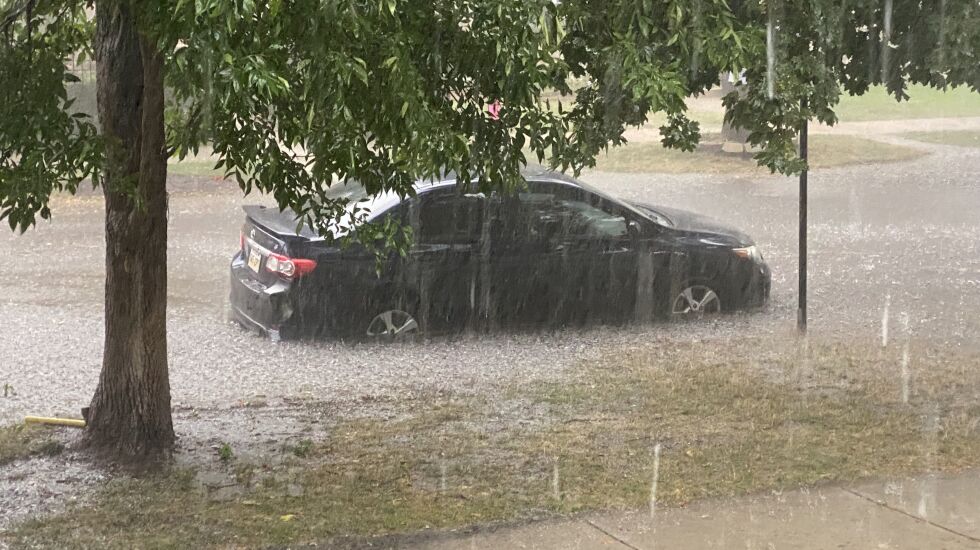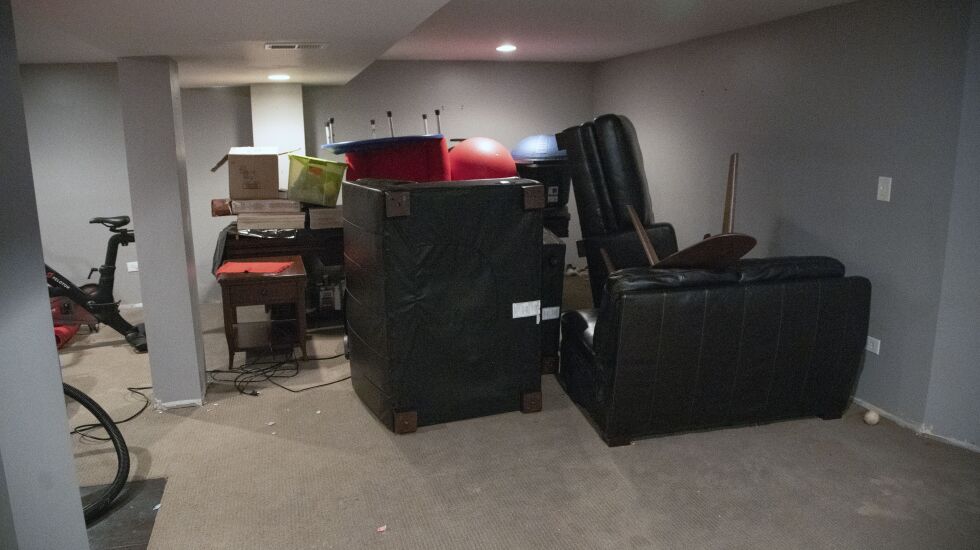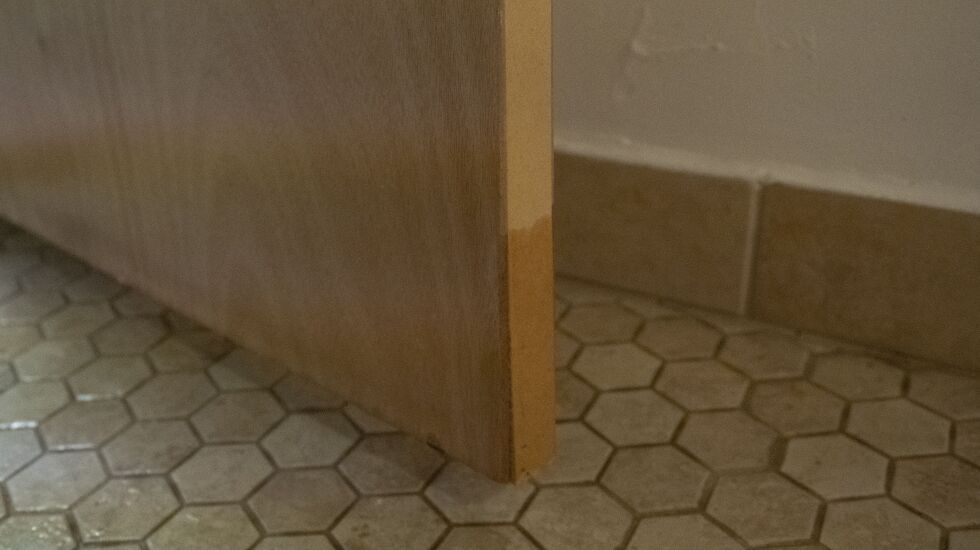
Chris Meyer was roused by an in-law Sunday morning to check the basement.
It was raining hard. Really hard.
“I said ‘Goddammit. Not again,’” said Meyer, 47, who lives near Wilson Avenue and Pulaski Road.
So he looked.
“Yup, water was coming up through the basement drain and under the rear basement door,” Meyer recalled Monday. By the time he checked, about 3 inches already had accumulated, sparking flashbacks to May, when 6 inches of rain filled his finished basement, causing about $20,000 in damage.
After that, he installed slate flooring, drain tile and a sump pump.
As the water rushed in on Sunday, he wondered why the sump wasn’t working.
“Turns out, it wasn’t plugged in all the way. One of the dogs probably knocked it loose,” said Meyer. He pushed the plug further into the outlet and water began draining immediately.
He realizes he was lucky.
“A neighbor from a couple blocks away posted a video of a geyser of water shooting up from a sewer opening in the street,” he said.
While heavy rains and flooded basements may go together for a lot of Chicago residents, Sunday’s steady rains were unusual, at least in one respect, according to the National Weather Service.
The rainfall rates were more akin to those that can occur in tropical weather conditions or even during hurricanes, said Todd Kluber, a National Weather Service meteorologist.
“We were seeing total rain rates there were about 6 to 8 inches per hour,” Kluber said Monday. “Typical rainstorms are about 3 to 5 inches.”
That means if rain continued to fall at that rate for an hour, it would’ve accumulated to as much as 8 inches of water, but it only lasted about 10 minutes which resulted in about 1 inch of water — still significant enough to induce flooding throughout the city.
Kluber said the final rainfall total throughout the city varied, with the North Side receiving the brunt of the beating. O’Hare recorded about 1.95 inches of rain, and Midway recorded about 1.4 inches.
That paled in comparison to West Ridge, which suffered through the most rainfall, with an accumulation of about 4.25 inches. Some pockets of the North Side could have received as much as 4.5 inches of rain, according to the National Weather Service.
Overall North Side neighborhoods received anywhere between 3.5 inches to 4.5 inches of rain.
In Portage Park, Mark Zander had never had a flooding problem in the home where he’s lived for 17 years.
Until Sunday.
He had gotten up at 8:30 a.m. to go to church, then saw three inches of standing water in the basement. This even after installing a sump pump.
“I checked out the catch basin out in the backyard and it was really high and the sump pump had no where to pump the water to,” Zander says.
He had renovated the basement eight years ago, putting in living space and a bar at a cost of about $55,000. Monday, Zander was throwing away damaged items and putting the cost of repairs at about $40,000.

Zander’s neighbor Dylan Hannigan, meanwhile, was piling up some of his most prized possessions salvaged from his flooded basement on his dining room table.
He and his wife just moved into the house on Belle Plaine Avenue in July, and had been told flooding wasn’t a problem.
But when he checked his basement Sunday morning, the water was about a foot deep.
“The drain pipe basically just backed up, opened and flooded,” Hannigan says.
While Hannigan was luckily able to save his grandmother’s family album, they had to throw away other things that were damaged — books, pictures, diaries and sentimental items from their wedding day. He figures the damage will cost him about $2,000.

Megan Vidis, a spokeswoman for the Chicago Department of Water, said the city’s sewer system was never designed to take in that significant amount of rainwater in a short period of time.
“Look, a lot of this has to do with climate change, and unfortunately the sewer systems weren’t able to withstand the amount of rain we got,” Vidis said.
Vidis said with weather patterns drastically changing and breaking records every year, these things are bound to happen.
Mary May, spokeswoman with the Chicago Office of Emergency Management, said as of Monday morning there were 1,485 service requests related to Sunday’s flooding. A total of 7 viaducts were reported flooded, 1,177 reports of water in basements and 301 reports of water in the streets.
A flood watch issued by the NWS will be in effect through 10 p.m. Tuesday.
“OEMC is continuing to monitor weather conditions with the National Weather Service in Chicago and are advising residents to use caution and avoid driving through standing water on streets, viaducts and low-lying areas. At this time there are no road closures due to flooding,” May said.
Ald. Debra Silverstein (50th) said her office has been bombarded with phone calls since Sunday and have been trying to connect residents with resources to help them in the aftermath of the flooding.
“It was a crazy day yesterday and it’s continuing today as well,” Silverstein said. “We still have not been able to put the phones down.”
Silverstein, whose ward covers the hard-hit West Ridge, said she received reports from the city this morning indicating there were as much as 6 inches of rainwater at one point. It only took an hour for that much rainwater to accumulate, she said.
More than 2,000 homes across the North Side have reported flooding in their basements, Silverstein added.
“I think this was a historic storm and very isolated,” Silverstein said. “It was just a small band that went across the North Side of the city and at this point I don’t believe anything could’ve been done to prevent it.”
But, she said, city crews were out throughout the North Side Monday morning inspecting main sewers to make sure they were functioning properly, so a complete report is still pending.
The Chicago Fire Department responded to a handful of incidents on Sunday involving cars stuck in high water, said CFD spokesman Larry Merritt, though he didn’t have an exact number.







